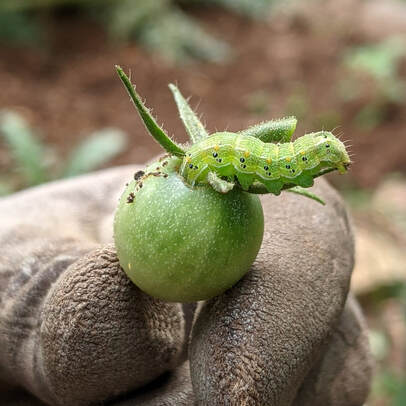 This past Saturday we found a green, spotted caterpillar that was devouring one of our sungold tomatoes at the teaching gardens Zilker Botanical Garden. Caterpillars like this and the tomato hornworm, can be a major pest in gardens.They also feed on other plants in the Solanaceae (nightshade) family: eggplants, peppers, tobacco, and potatoes. They blend in quite easily with the green foliage and feed non-stop, creating spotty and chewed leaves and fruit HOW TO GET RID OF TOMATO WORMS 👌Handpicking - The caterpillars can neither sting nor bite. If you are squeamish about crushing these large insects, drop them into soapy water instead (or feed them to your chickens.) 🧼Insecticidal soaps will also kill hornworms, but the pests need to come into direct contact with the substance. 🌻Increase Plant Diversity: Plant crops that attract natural predators of caterpillars such as wasps, lacewings, birds, lady bug beetles, and spiders. Plant things like sunflowers, marigolds, buckwheat and mulch with straw or leaf mulch to give a home for these insects in your garden. 🐛Insecticides should be a last resort. You can use the organic pesticide Bt (Bacillus thuringiensis), which is a bacterium that acts as a stomach poison on some larval insects (but doesn’t harm other plants or animals). Bt must be ingested by the caterpillars to be effective, and it must be reapplied to plant foliage after rain. NEXT ONLINE EVENT Don’t miss our next online guest, Jay White, the publisher of Texas Gardener Magazine who will be presenting more on this topic in his “Pest-free Organically” talk on May 10th at 6 PM CST. BECOME A MEMBER All of our online education FREE and we are always looking for new members to help us support our mission. Visit AustinOrganicGardeners.org to become a member of the oldest organic garden club in America. Memberships are only $10 a year and 100% of dues go to the Zilker Botanical Garden. BONUS: AOG Members get a discount code for a subscription to Texas Gardener Magazine. |
AuthorWrite something about yourself. No need to be fancy, just an overview. Archives
May 2024
Categories |
 RSS Feed
RSS Feed